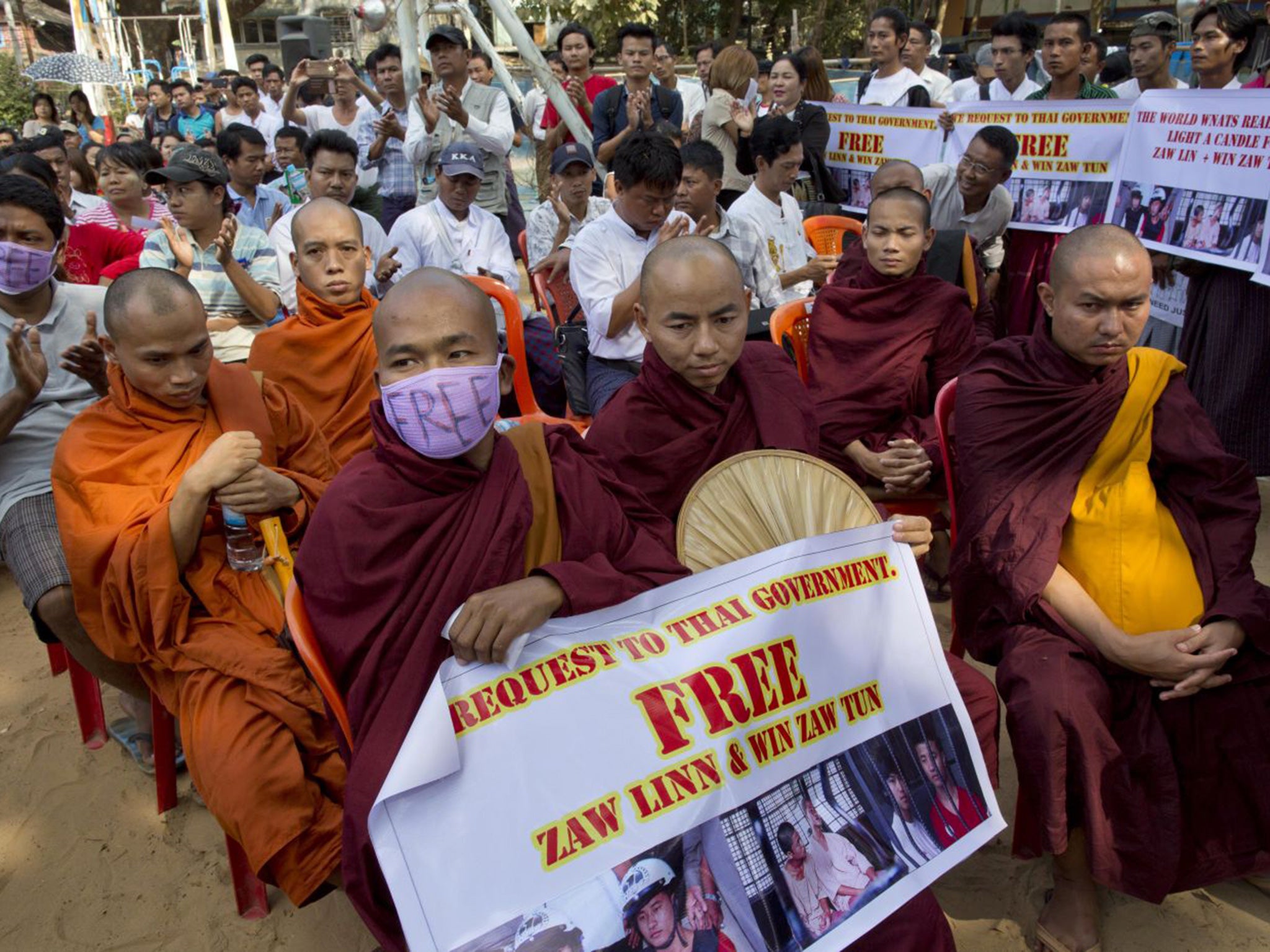Burmese anger builds following Thai beach murders case
Two Burmese migrant workers have been sentenced to death in Thailand following the murder of two backpackers

Your support helps us to tell the story
From reproductive rights to climate change to Big Tech, The Independent is on the ground when the story is developing. Whether it's investigating the financials of Elon Musk's pro-Trump PAC or producing our latest documentary, 'The A Word', which shines a light on the American women fighting for reproductive rights, we know how important it is to parse out the facts from the messaging.
At such a critical moment in US history, we need reporters on the ground. Your donation allows us to keep sending journalists to speak to both sides of the story.
The Independent is trusted by Americans across the entire political spectrum. And unlike many other quality news outlets, we choose not to lock Americans out of our reporting and analysis with paywalls. We believe quality journalism should be available to everyone, paid for by those who can afford it.
Your support makes all the difference.In one of the most celebrated tourist hotspots in the country, a beautiful young foreign girl is brutally murdered, and her foreign male companion beaten unconscious and left to drown. If Thai police felt under pressure to produce a quick result in the murder of Hannah Witheridge and David Miller on the island of Koh Tao in September 2014, it is not surprising. And produce a quick result they did.
The investigation culminated in two Burmese migrant workers, Zaw Lin and Wai Phyo, being sentenced to death on Christmas Eve. But if the Thai authorities hoped this would draw a line under the affair, they were mistaken.
Yesterday, the Burmese foreign minister summoned Thailand’s ambassador for “discussions” on the issue, and demanded a commitment from Bangkok “to protect the Burmese community from harm”. As protests inside and outside Burma continued to spread, with members of a prominent group of nationalistic Buddhist monks staging sit-down protests, Thailand was forced to close its embassy in Rangoon, Burma’s commercial capital, for a week, citing the “unexpected and prolonged” demonstrations.
In the Burmese capital, Naypyidaw, General Min Aung Hlaing, the head of Burma’s armed forces and the most powerful political figure in the country, made a rare intervention in foreign affairs, demanding a re-trial.
The extent of the growing protests reflects simmering resentment about the lopsided relations between the two majority Buddhist nations, as a consequence of which 2.5 million Burmese migrants work in ill-paid jobs in Thailand, often in poor conditions, while 150,000 more are stuck in refugee camps, victims of decades of civil war in Burma’s border regions. But the anger also reflects deep disquiet about the case which goes beyond issues of national pride.
Police investigating the murder were quick to claim that the culprit “could not have been Thai”. Speculation about the possible involvement of a third British holidaymaker fizzled as quickly as it surfaced. When the first team of investigators indicated that they were looking at someone from a powerful local family, their commander was quickly transferred and all such talk stopped.
Instead, focus switched quickly to the two Burmese bar workers sentenced last week. The two men freely admitted to being on the same beach as the murder victims on the evening in question, but only “confessed” to the crimes after what they described as torture. They were quick to withdraw the admissions subsequently, and the confessions did not determine the court’s verdict, which focused instead on DNA evidence. But there, too, there have been charges of incompetence if not worse.
Andy Hall, an activist on behalf of migrants in Thailand who was involved in preparing the defence of the Burmese men, told The Independent: “The only real evidence was a claimed correlation between DNA found on Hannah’s body and on cigarettes which the two men had been smoking on the beach – but the prosecution never produced the cigarettes in court. The men admitted to being close to the murder scene – they said they were very drunk, that they went for a swim and then went home. All the other evidence against them was circumstantial. The presentation of the prosecution case was very shabby.”
Although the case for the prosecution depended on the alleged DNA evidence, no independent scrutiny was permitted at the trial, while Thailand’s best-known forensic scientist, Dr Pornthip Rojanasunand, testified that the crime scene had been poorly managed and evidence improperly collected.
The families of the victims, echoing the UK Foreign Office, have said they are satisfied with the verdict. Many observers consider that conclusion premature, and perhaps simply wrong.
Join our commenting forum
Join thought-provoking conversations, follow other Independent readers and see their replies
Comments